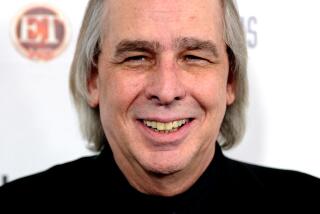‘Humble Harve,’ former KHJ ‘Boss Radio’ DJ who killed wife, dies at 84
Veteran radio DJ “Humble Harve” Miller, whose six-decade career was forever marred by the shooting death of his wife in 1971, for which he pleaded guilty, went to prison and then resumed his place behind the microphone for 40-plus more years, died Tuesday in Camarillo, his wife, Serena Miller, confirmed. He was 84.
He had recently battled with diabetes and cellulitis, she said, and he had been in hospice care when he died.
For the record:
9:30 a.m. June 7, 2019An earlier edition of this post misidentified the Philadelphia radio station for which DJ Harvey Miller worked early on as WBIG-AM. It was WIBG-AM.
Although Miller held stints with at least 19 stations throughout his life, he made his biggest mark at KHJ-AM (930) in L.A. during the peak of its “Boss Radio” format that changed the sound and content of pop radio in the ’60s.
Miller held nighttime slots, first from 6 to 9 and then the 9-to-midnight posts, at the game-changing station that also featured such L.A. radio luminaries as Robert W. Morgan, the Real Don Steele, Charlie Tuna, Sam Riddle, Bobby Tripp and Johnny Mitchell.
“When the music was hot, so were we,” Miller told The Times in 2003. “We were right in the midst of the hottest place in the world, musically. This was the center of everything — all the recording studios were going 24 hours a day. We were right in the center of all that energy.”
Director Quentin Tarantino included Humble Harve as a character in his latest film, “Once Upon a Time in Hollywood,” set in 1969.

Miller’s role at KHJ ended abruptly in May 1971, however, when he shot his wife during an argument at their Hollywood home, fled the scene and remained in hiding for nearly two weeks until he turned himself in. At that time, he had shaved off his signature dark mustache and goatee, and had dyed his hair red.
Though he initially pleaded not guilty, he changed his plea to guilty of second-degree murder. His lawyer argued successfully that Miller’s wife, Mary Gladys Miller, pulled a gun on him, and as he tried to take it from her, the gun discharged, firing a single shot to her chest.
In sentencing Miller three months after he surrendered to authorities, L.A. County Superior Court Judge Arthur L. Alarcon gave him five years to life, pronouncing the killing a “situational crime” that could not reoccur, and recommended he be considered for parole in 3 ½ years. Miller expressed remorse for his wife’s death at that proceeding and told the court, according to United Press International, “She was my wife, my lover, my partner and my companion for life. I swear to God I never meant to harm her.”
Ultimately, Miller served about three years, Serena Miller said, after earning credits for good behavior while incarcerated at the California Institution for Men in Chino. While in prison, he taught radio skills to other inmates, and also recorded materials for use by the blind.
“He did his time, he paid his debt to society and he let sleeping dogs lie,” longtime friend and fellow DJ Brian Roberts said Wednesday. “He just wanted to get on with his life.”
Upon his release, he joined fledgling pop radio station KIQQ-FM (100.3), colloquially known as K-100. The station was operated at the time by pioneering radio programmer Bill Drake, who had co-created the Boss Radio format and brought Miller to the stable of KHJ “Boss Jocks” in 1967.
Miller returned to L.A. radio proper then moved on in 1974 with a show on KKDJ-FM (102.7), the predecessor to radio powerhouse KIIS-FM, the call letters used beginning in 1976. Subsequently he did shows on KUTE-FM (101.9), KRLA-AM (1110) and KRTH-FM (101.1) among many other stations, and also spent time with the Westwood One radio syndication firm.
Harvey Miller was born May 26, 1935, in Philadelphia. After working briefly in the record business in promotion, he began what would be a long career in radio in 1958, landing his first job in that field at WAAT-AM in Trenton, N.J. He soon moved to Top 40 station WIBG-AM in Philadelphia, where he worked from 1958 to 1962.
After moving to Los Angeles in 1965, he was hired at KBLA-AM (1580), a tiny station in Burbank, where he nonetheless was soon noticed by the powers-that-be at L.A. radio’s heavier hitters, leading to his jump to KHJ starting Feb. 1, 1967.
With the Boss Radio format that had been introduced two years earlier — which cut DJ chatter and narrowed playlists from the standard Top 40 to their heavily promoted “Boss 30” — KHJ surpassed longtime ratings champ KRLA and assumed the leadership role among music fans at the time.
“I realized my greatest achievement of a 21.0 share doing 6 p.m. to 9 p.m.,” Miller once told an interviewer, underscoring that rating was 21.0 and not a 2.1, the latter more typical of individual radio show ratings today.
During a teen fair at the Hollywood Palladium during that golden era of AM rock radio, listeners were asked to identify the biggest influences in their lives.
“The order was: God, disc jockeys, then parents,” Robert W. Morgan recalled years later.
The importance of such AM stations in the careers of musicians was hard to overestimate.
“Bands would cut a record on Tuesday, and Wednesday they’d give us a tape,” Charlie Tuna, born Art Ferguson, told The Times in 2003.
While at KHJ, Miller also narrated the 1967 counterculture documentary “Mondo Mod” and was the voice of KHJ’s groundbreaking 48-hour “History of Rock & Roll” special, which was broadcast virtually uninterrupted over three days in 1969 and was one of the first significant retrospectives of a musical genre still largely considered disposable at the time.
KHJ’s Boss Jocks, a term that was retired in 1971 in conjunction with Miller’s court case, were so influential that at its peak, the station was attracting 1 in 4 listeners in the L.A. area.
“All I remember was that KHJ was important in helping launch the band,” Doors founding member and drummer John Densmore said Wednesday. “Maybe they dragged their feet in playing the [6-minute] long version of ‘Light My Fire.’ But I do remember Humble Harve wasn’t very humble.”
Indeed, the biography page on his own website, www.cruisinoldiesdiner.com, on which he continued in recent years to post specials devoted to rock hits of yore, describes him as “A Radio Legend, and arguably the ‘coolest’ personality in the history of broadcasting.”
Still, Miller professed that it was the music, not himself, that he has considered the focal point of his shows over the decades.
“We are emcees,” Miller said decades after his heyday, after shifting to spinning oldies rather than the hits of the day. He also hosted a syndicated “National Album Countdown” show in 1983, and portrayed a DJ in the 1993 film “There Goes My Baby.”
Despite his numerous jobs and plethora of radio stations over the years, Miller seemed to consider his run at KHJ as the pinnacle of his career.
“Life at KHJ in the ’60s was like New Year’s Eve every night,” he told The Times in 1993. “We played happy, fun music. The music was inspired. It was the poetry of a generation.”
Serena Miller, his only survivor, said she has made no plans yet for a memorial service.
Follow @RandyLewis2 on Twitter.com
For Classic Rock coverage, join us on Facebook
More to Read
The biggest entertainment stories
Get our big stories about Hollywood, film, television, music, arts, culture and more right in your inbox as soon as they publish.
You may occasionally receive promotional content from the Los Angeles Times.










